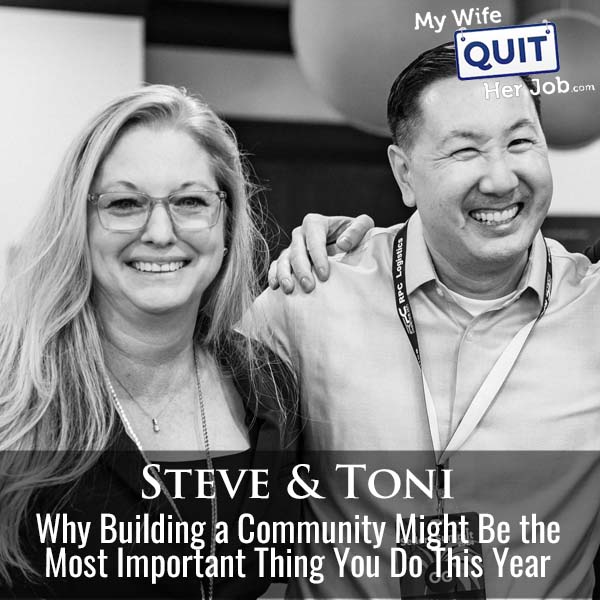596: Why Building a Community Might Be the Most Important Thing You Do This Year

```html MyWifeQuitHerJob.com Explores Community Building in E-Commerce: A Deep Dive into Discord and Beyond
In the ever-evolving landscape of e-commerce, fostering a strong community is becoming increasingly vital for business success. Steve Chou, founder of MyWifeQuitHerJob.com, recently explored the intricacies of community building with Toni, diving into the pros and cons of various platforms and strategies in his latest podcast episode. The discussion centered around Chou's recent launch of a Discord community for his course members, examining its potential and the broader implications for online businesses.
The Shift Towards Community-Centric Strategies
Chou highlights a growing need to move beyond traditional marketing channels like email and SMS, which are facing declining deliverability rates. He posits that building a community offers a more sustainable and engaging way to connect with customers and foster loyalty. This shift reflects a broader trend in the digital world, where consumers are increasingly seeking authentic connections and shared experiences.
Discord: A Platform for "Geeks" and Beyond
The decision to use Discord was driven by its extensibility, robust API, and cost-effectiveness. "Discord is like the platform for geeks. Like they have an awesome API. You can make bots, you can code in all these features and it’s free," Chou explained. The platform's flexibility allows for customization and integration with other tools, making it appealing for those with technical expertise. However, Chou acknowledged a potential learning curve for some users, particularly those less familiar with the platform.
Addressing the Tech Barrier
While the initial launch saw a few users encountering difficulties joining the Discord community, Chou emphasized that such challenges are common with any new platform. He and his team are actively addressing these issues and providing support to ensure a smooth onboarding process for all members.
Facebook Groups: A Love-Hate Relationship
The podcast episode delved into the shortcomings of Facebook groups as a community-building tool. Chou expressed frustration with the platform's poor search functionality, cluttered interface, and the potential for distractions. Toni, on the other hand, noted that Facebook may be a better platform for certain demographics.
The Drawbacks of Facebook
Chou argued that Facebook's algorithm often limits the reach of posts within groups, and the platform's inherent distractions can lead to wasted time. "Once you get on to go into the community to answer a question, then you’re on Facebook, then you’re like, oh, someone tagged me in a photo from high school that I don’t want on the internet...so then what becomes a simple answering a question now turns into 30 to 45 minutes of time wasted," he stated.
The Time Investment: A Critical Consideration
Toni emphasized the significant time commitment required to manage an active and thriving community. Keeping a community engaging, productive, and free from spam requires dedicated effort. While AI tools like ChatGPT might offer some assistance in the future, human moderation and engagement remain crucial for fostering a positive and supportive environment.
Expert Perspective: The Importance of Active Moderation
Dr. Sarah Miller, a social media marketing consultant, emphasizes the critical role of active moderation in online communities. "A community is only as good as its moderation. Unchecked spam, negativity, or irrelevant content can quickly erode trust and drive members away," she explains. "Investing in dedicated moderators or training community members to assist with moderation is essential for long-term success."
Exploring Alternative Platforms
The discussion touched on other community platforms, including Slack (which Chou deemed too expensive for large communities) and Geneva (a platform neither Chou nor Toni were familiar with). The importance of choosing a mainstream platform to maximize reach and accessibility was highlighted.
Historical Context: The Evolution of Online Communities
The concept of online communities has evolved significantly since the early days of the internet. From bulletin board systems (BBS) to early forums and chat rooms, the desire for online connection has always been present. The rise of social media platforms like Facebook initially seemed to consolidate these communities, but the challenges outlined by Chou and Toni suggest a growing fragmentation and a renewed search for more focused and controlled environments.
Current Context: The Rise of Niche Communities
The trend towards niche communities reflects a broader desire for more personalized and relevant online experiences. Platforms like Discord, with their focus on specific interests and their customizable features, are well-positioned to cater to this demand. The success of these communities hinges on their ability to provide value, foster genuine connections, and maintain a positive and engaging environment.
Analytical Viewpoint: The Future of Community Building
According to market analyst David Lee, the future of community building lies in striking a balance between automation and human interaction. "AI can assist with tasks like content moderation and customer support, but it can't replace the human touch," he argues. "The most successful communities will be those that leverage technology to enhance, not replace, the human element."
Conclusion
Building a thriving online community requires careful planning, strategic platform selection, and a significant time investment. While challenges exist, the potential benefits of fostering a loyal and engaged customer base make it a worthwhile endeavor for e-commerce businesses. As the digital landscape continues to evolve, community-centric strategies will likely become even more critical for success. ```
Originally sourced from: WifeQuitHer Job
